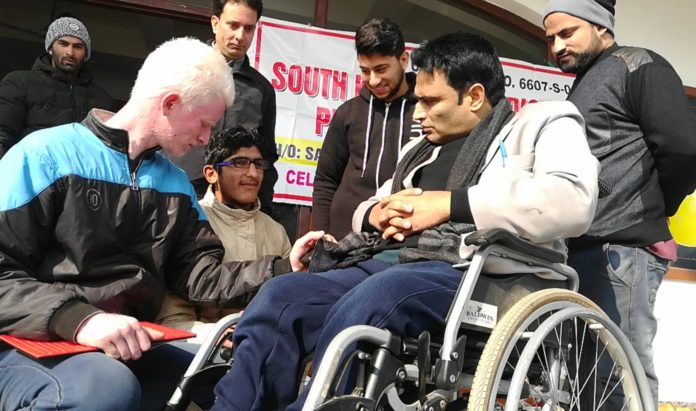By Sameer Ahmad
Srinagar (NVI): Social Welfare Department is supposed to work for the benefit of disabled people but in Kashmir, most of the buildings housing their offices are unfriendly for the physically-handicapped people.
The disabled people find it an uphill task to reach officers and other staffers in the Social Welfare Department as these lack the ramps and handrails, besides being situated upstairs.
According to the 2011 census, the total population of disabled persons in Jammu and Kashmir was 361702.
According to Javaid Ahmad Tak, a representative of National Disability Network (NDN) in Kashmir, Parliament in 2016 passed the ‘Rights of Personal Disabilities bill and it was enacted in Jammu and Kashmir last year through an Ordinance issued by the Governor.
“But we still don’t know whether it was implemented on the ground. The government has left us to the God’s mercy as it does not pay any attention to us,” wheelchair-bound Tak told News Vibes of India (NVI).
The 47-year-old was injured in 1997 during a firing incident in his native village in Anantnag district’s Bijbehara area. His spinal cord was severely damaged in the incident, causing permanent disability to him.
Tak said Prime Minister Narendra Modi had on December 3,2015, launched the Accessible India Campaign (AIC) with the objective that old buildings/infrastructure would be renovated to create accessibility for the disabled persons.
In the campaign, the government had identified 25 buildings in each state capital for renovation and constructing of ramps in buildings, instead of stairs.
In 2018, the access audit in Kashmir was completed and the government released Rs 1.44 crore to the social welfare department to create accessibility for the disabled persons in Kashmir, said Tak, who runs an NGO for disabled children.
“Unfortunately, the department has not utilized funds on the ground,” he added.
Talking to NVI, Nisar Ahmad Bhat, Chairman of South Kashmir Handicapped Association said, “We are facing a lot of hardships during our visits to any government office in Kashmir particularly the Social Welfare Department.”
According to the Jammu and Kashmir Persons with Disabilities (Equal Opportunities, Protection of Rights and Full Participation) Act, 1998, “the government and the local authorities shall, within the limits of their economic capacity and development provide for – a) ramps in public building; b) adaptation of toilets for wheel-chair users; c) Braille symbols and auditory signals in elevators or lifts; d) ramps in hospitals, primary health centers and other medical care and rehabilitation institutions.”
Tak had filed a PIL last year in the High Court, pleading for implementation of the Disability Act in Jammu and Kashmir, utilisation of funds released under the AIC and increase in the disabilities pension from Rs 1000 to Rs 3000.
Taking to NVI, Dr Farhat, Anantnag District Social Welfare Officer, said these ramps should be made compulsory for the disabled persons in every sector.
“Yes, it is right that the disabled persons are facing hardships in Kashmir, not only in government offices but also in private sector too. I heard that the Accessible India Campaign (AIC) funds will be utilized very soon on the ground to create the accessibility infrastructure for personal disabled persons in Kashmir,” Farhat said.








